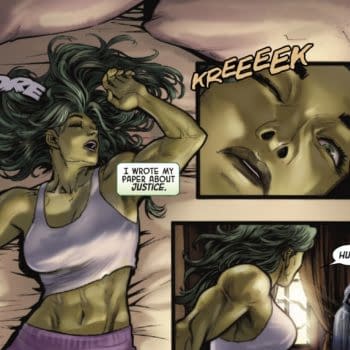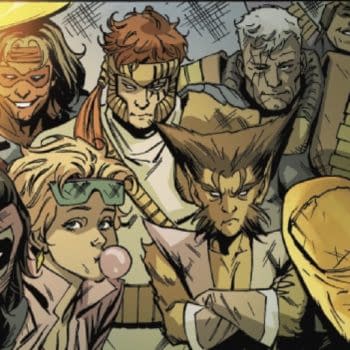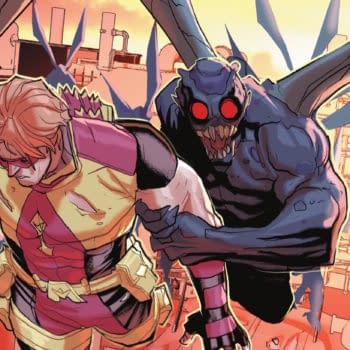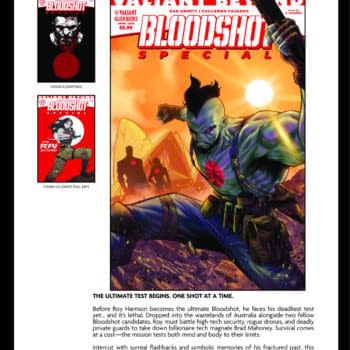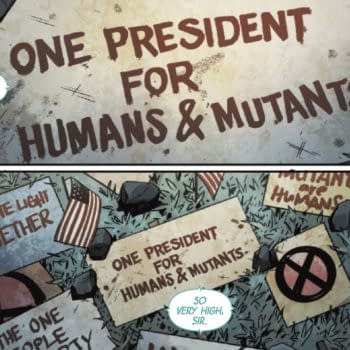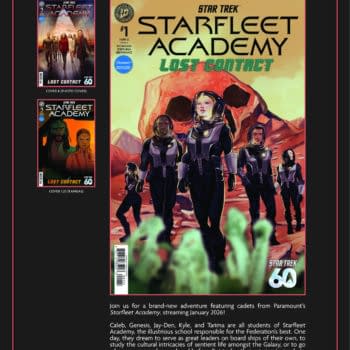Posted in: Comics, Look! It Moves! by Adi Tantimedh, Recent Updates | Tagged:
Look! It Moves! #65: The Games Of Our Times!
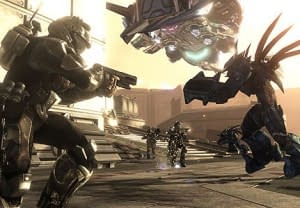
I was going to write about HALO: REACH this week, even though I haven't bought or played it yet, other than the multiplayer beta back in late Spring, but then I'm not reviewing it, but looking at its place in the current zeitgeist, and there's another game, completely different in tone that caught my attention. Strangely, both HALO: REACH and RECETTEAR now occur the same place in my mind as emblematic games for our two most prevalent anxieties right now: War and Financial Ruin
 An American friend expressed some disquiet over HALO: REACH being released so close to the anniversary of 9/11. Even REACH's campaign slogan, "Remember REACH" and "Remember how it all began" carries the same kind of portentious tone that you might see in people anticipating the anniversary of 9/11 with sadness, anxiety and even some mythical awe. Some people might think this kind of ad campaign might have ideas above its station for what's really a Science Fiction pulp plot wrapped around an escapist war simulator video game. I wonder if the marketing department at Microsoft designed the REACH campaign deliberately to tap into that. For those who don't know – I count maybe five of you out there – HALO: REACH's story is prequel. It takes place before the first game, HALO: COMBAT EVOLVED, on the last human colony standing, Reach, as the religious zealot forces The Covenant push towards Earth to exterminate Humanity. People who followed HALO's backstory know that Reach is doomed, the whole planet ends up getting glassed by the Covenant, killing hundreds of millions of people, making the Master Chief the last surviving Spartan to fight through to the end of the war in the first three HALO games. To go back to the beginning after the story ended in the third game feels circuitous, like the game is never going to end, despite this being Bungie's last entry in the series before handing it over to Microsoft, who now own the franchise, and will pick some other developer to make HALO 4 as soon as they figure out what kind of story to take the Master Chief and Cortana in next.
An American friend expressed some disquiet over HALO: REACH being released so close to the anniversary of 9/11. Even REACH's campaign slogan, "Remember REACH" and "Remember how it all began" carries the same kind of portentious tone that you might see in people anticipating the anniversary of 9/11 with sadness, anxiety and even some mythical awe. Some people might think this kind of ad campaign might have ideas above its station for what's really a Science Fiction pulp plot wrapped around an escapist war simulator video game. I wonder if the marketing department at Microsoft designed the REACH campaign deliberately to tap into that. For those who don't know – I count maybe five of you out there – HALO: REACH's story is prequel. It takes place before the first game, HALO: COMBAT EVOLVED, on the last human colony standing, Reach, as the religious zealot forces The Covenant push towards Earth to exterminate Humanity. People who followed HALO's backstory know that Reach is doomed, the whole planet ends up getting glassed by the Covenant, killing hundreds of millions of people, making the Master Chief the last surviving Spartan to fight through to the end of the war in the first three HALO games. To go back to the beginning after the story ended in the third game feels circuitous, like the game is never going to end, despite this being Bungie's last entry in the series before handing it over to Microsoft, who now own the franchise, and will pick some other developer to make HALO 4 as soon as they figure out what kind of story to take the Master Chief and Cortana in next.
The plot and mythos of HALO is not Tolstoy's WAR AND PEACE IN SPACE, but essentially competent pulp cobbled together from Larry Niven's RINGWORLD series, bits of Iain M. Banks' Culture (the sardonic AI character stuff, in case you're wondering), the Space Marines from James Cameron's ALIENS. The story always threatened to become much more interesting but never doing so, staying within the more generic – and manageable – arena of a shooter war game. Alas, in games, the gameplay has to take priority over story. Many players on HALO and CALL OF DUTY: MODERN WARFARE don't even bother with the singleplayer campaign to get through the story at all but go straight to the online multiplayer, but that also contributes to the mood we're currently living in, that of constantly unending, repetitive War, and in the case of those lucky enough to be living in the West and not in the military, war on foreign or alien soil.
What strikes me about the HALO series is how it's lasted this whole decade and positioned itself squarely in the wartime mood of the zeitgeist. The first HALO had to been in development for at least two years before its release in 2001, so you can't accuse it of cynically cashing in on 9/11. The sequels might have what you could draw analogies with the war in Iraq and War on Terror with the Covenant fleshed out as an evil empire of religious fanatics bent on the extermination of the human race, and then the revelation that the religious leaders of the Covenant had lied to their followers in order to get them to kill the humans so that they themselves could attain power and godhood. The beauty of fiction, metaphor and allegory is that it both is and isn't about what's going on in real life and thus avoid the dodgy ideological prejudices of more 'realistic' games like MODERN WARFARE. The Covenant is a convenient alien Other to be killed without feeling remorse. I can't help feeling that all those people, all those kids, and all those soldiers abroad playing HALO and MODERN WARFARE multiplayer are in a kind of ethereal loop, reliving the sense of perpetual war we're in now. But then popular culture has always involved reflecting and trying to make sense of what's going on, and HALO is part of that continuum, even the bits where 14-year-old sociopaths who have played for hundreds of hours more than you effortlessly head-shot and tea-bag you, and the slapstick comedy of the ragdoll physics when you mess up a throw and accidentally blow your own avatar across the landscape with a sticky grenade. I'm not slamming it, I'm in the loop as much as everyone else who plays it.
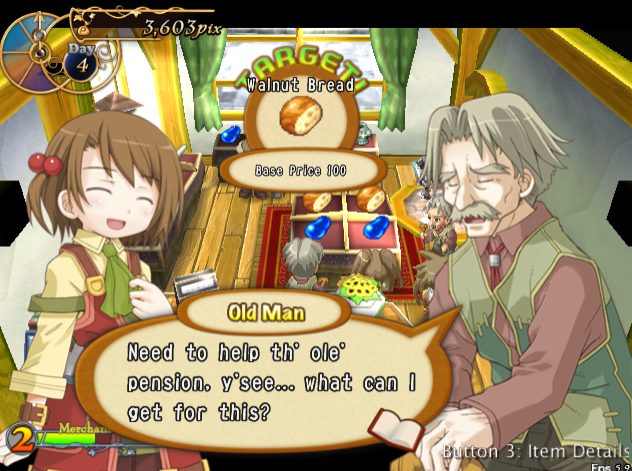
RECETTEAR: AN ITEM SHOP'S TALE was released late last week, and is in many ways the diametrical opposite of HALO: REACH. I suddenly find I can't talk about HALO: REACH without talking about this game. It's from Japan, made by doujin group EasyGameStation back in 2007 and localized by indie group Carpe Fulgur. (Thought I'd finished talking about doujin groups, right? So had I). It is utterly, wonderfully, batshit-bonkers. It's a spoof computer role-playing game where instead of a questing hero, the heroine is a hapless girl who runs the type of item shop all RPGs have for the heroes to buy weapons, armour, food and crap. She has to run the shop and be profitable in order to pay off her missing father's debts and not end up homeless and living in a cardboard box, which is the Game Over.
Set in a fantasy Not-France, the game has the kind of whimsical humour that hides real teeth, not so dissimilar to Terry Pratchett's DISCWORLD novels, which are really satires of contemporary mores with a fantasy setting. Recette's father had taken out loans and skipped out to be an adventuring hero but "mysteriously" disappeared in a fracas with a large dragon over a volcano. Recette wakes up one morning to find a fairy named Tear at the door telling her she has to assume her father's astronomical debt or have the house repossessed and end up on the streets. Tear suggests she turn their house in to a general shop to buy items low and sell high in order to make the payments and keep the house, so Recette effectively ends up in debt slavery as she has to work her arse off to pay off the mortgage, but Tear advises her that the way to run a successful business is not to bilk customers but to haggle for a price both reasonable to customers – and 'reasonable' differs depending on the customer – in order to maintain good relations and give them incentive to return to the shop as regulars. "Recettear" is the name of the shop, an amalgam of both the irrepressibly bubbly Recette and Tear's names, and which the latter ruefully notes that if mispronounced, it would sound like "racketeer" and hopes the customers don't realise this.

There are plenty of odd jokes in RECETTEAR: Tear explains that she's a debt collector because that's the only job she could find since there are very few job opportunity for fairies the agency could find for her. Tear and Recette hire adventurers to go dungeon-crawling, putting their arses on the line and killing dangerous (but cute) blobs and monsters just so they can find valuable items to sell back at the shop. Recette gets a rival in the form of a spoiled girl who's the heiress of a big chain of item shops with her own personal fairy. Everything is depicted in a cutesy manga-anime art style while jokes about poverty, murder and bankruptcy, not to mention the absurdity of haggling with a customer over the price of a magic staff are trotted out. The game is actually a direct reflection of the mood over the stagnant economy since the Bubble burst in Japan and Asia in 1990s. Stories of parents skipping out on debt and leaving their hapless kids with the debt has been commonplace in Japanese manga, anime and fiction for a while now, being the plot springboard for otherwise light-hearted series like HAYATE THE COMBAT BUTLER. It's especially surreal that Tear is essentially a cute, moe version of what would be a Yakuza debt collector in real life, but here you get a cute fairy who wears glasses. Yet under all the cuteness, the game catches the general mood of anxiety from economic instability that started in Japan and that the rest of us now experience.

HALO: REACH may give you a power fantasy about being a bad-ass space soldier, but RECETTEAR might actually teach you how to run a business, maintain good customer relations, stay solvent and keep the bill collectors at bay.
If you're reading this, you already know where and how to buy HALO: REACH. RECETTAIR: AN ITEM SHOP'S TALE is a PC game (no Mac version) available only for download from Steam, Impulse and Gamers Gate, all via these links…
Haggling for a decent price at lookitmoves@gmail.com
I've begun the official LOOK! IT MOVES! twitter feed. Follow me at http://twitter.com/lookitmoves for thoughts and snark on media and pop culture, stuff for future columns and stuff I may never spend a whole column writing about.
© Adisakdi Tantimedh






